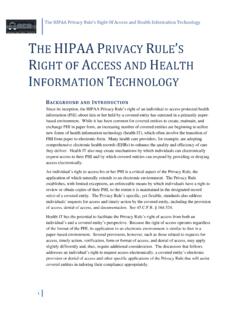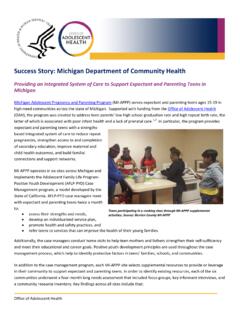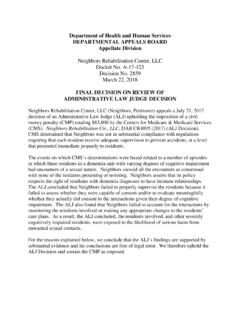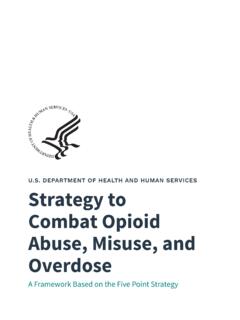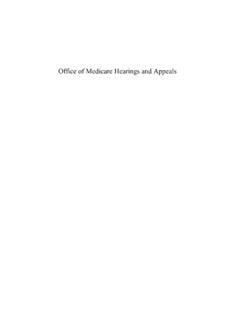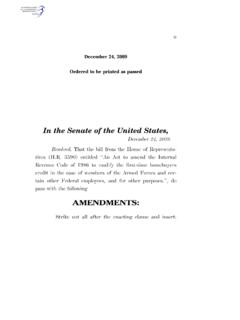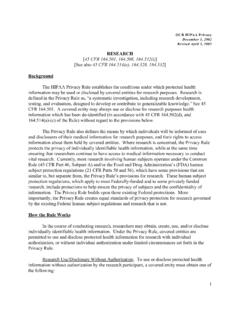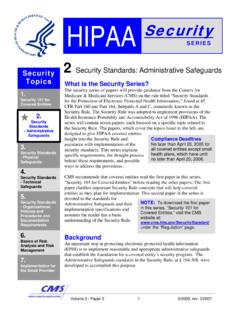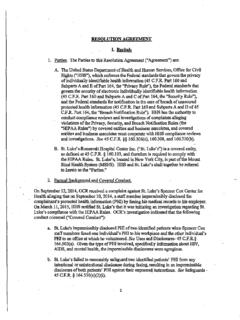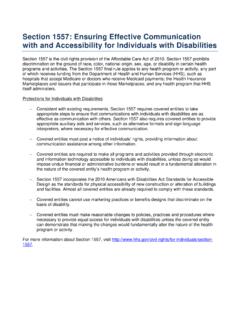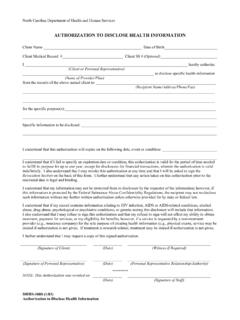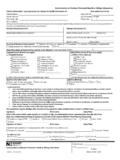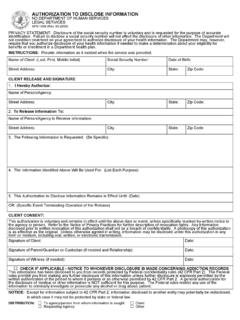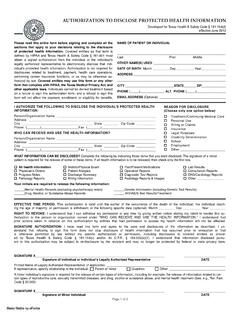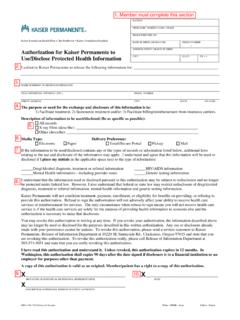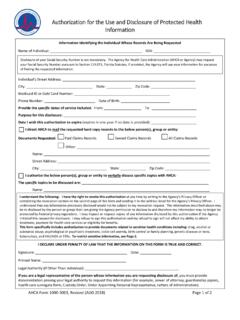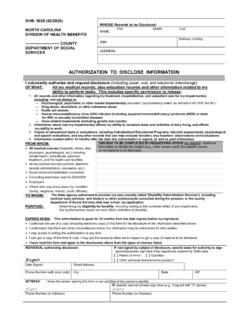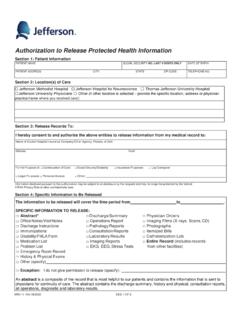Transcription of Joint Guidance on the Application of HIPAA and FERPA to …
1 Department of health Department of Education and Human Services Joint Guidance on the Application of the Family Educational Rights and Privacy Act ( FERPA ). And the health Insurance Portability and Accountability Act of 1996 ( HIPAA ). To Student health Records December 2019 Update ()LUVW ,VVXHG 1 RYHPEHU 2008). Contents I. 3. II. Overview of FERPA . 3. III. Overview of HIPAA .. 5. IV. Where FERPA and HIPAA May Intersect .. 7. V. Frequently Asked Questions and Answers .. 7-25. Which Rule Applies? 1. Does the HIPAA Privacy Rule apply to an elementary or secondary school? 2. Does FERPA or HIPAA apply to student health records maintained by a health care provider acting for a FERPA -covered elementary or secondary school that is not employed by the school? 3. Does FERPA or HIPAA apply to records on students at health clinics or other health care facilities run by postsecondary institutions? 4. Does FERPA or HIPAA apply to records on students who are patients at a university hospital?
2 5. Does FERPA or HIPAA apply to the health records of an individual who is both a student and an employee of a university at which the person receives health care? 6. Are all student records maintained by a health clinic within a postsecondary institution considered treatment records under FERPA ? 7. Can a postsecondary institution be a hybrid entity under the HIPAA Privacy Rule? What information Can Be Shared? 8. Where HIPAA applies, when an individual reaches the age of majority or becomes emancipated, who controls the protected health information (PHI). concerning health care services rendered while the individual was an unemancipated minor? 9. Where HIPAA applies, when can a health care provider share an adult child's PHI. with a parent if the adult child has not signed an authorization or asked the provider to send a copy of their records to the parent? 10. Where FERPA applies, when can a school disclose an eligible student's personally identifiable information (PII) from education records to his or her parent if the eligible student has not provided written consent?
3 11. Does HIPAA allow a health care provider to disclose PHI about a minor child with a mental health condition and/or substance use disorder to the parents of the minor? 12. Does FERPA permit a school to disclose PII from the education records of a student, who is under the age of 18 years and is not attending a postsecondary institution, with a mental health condition and/or substance use disorder to the parents of the student? 13. What options do family members of an adult patient with mental illness have under HIPAA if they are concerned about the patient's mental health and the patient refuses to agree to let a health care provider subject to HIPAA share information with the family? 1. 14. What options do the parents of an eligible student with mental illness have under FERPA if they are concerned about the student's mental health and the eligible student refuses to provide consent to permit a school subject to FERPA to share PII from education records with the family?
4 15. Does HIPAA allow a health care provider to disclose PHI about a student to a school nurse or physician? 16. Does FERPA allow a school official to disclose PII from a non-eligible student's education records to a third-party health care provider without the written consent of the parent? 17. Does HIPAA allow a parent to access the medical records of his or her deceased child? 18. Does FERPA allow a parent to access the education records of his or her deceased child? 19. Under FERPA , may an eligible student's treatment records be shared with parties other than treating professionals? 20. When does FERPA permit an eligible student's treatment records to be disclosed to a third-party health care provider for treatment? 21. Under HIPAA , when can information be shared about someone who presents a serious danger to self or others? 22. Under FERPA , when can PII from a student's education records be shared, without prior written consent, about someone who presents a serious danger to self or others?
5 23. Under FERPA , can an educational agency or institution disclose , without prior written consent, PII from a student's education records, including health records, to the educational agency's or institution's law enforcement officials? 24. Does HIPAA permit a covered entity to disclose PHI to a Protection and Advocacy system where the disclosure is required by law? 25. Does FERPA permit an educational agency or institution to disclose PII from a student's education records to a Protection and Advocacy system? 26. Does HIPAA permit a school-based health care provider to report a student to the National Criminal Background Check System (NICS)? 27. Does FERPA permit an educational agency or institution to disclose , without prior written consent, PII from a student's education records to the NICS? VI. Conclusion 25. 2. I. Introduction The purpose of this Guidance is to explain the relationship between the Family Educational Rights and Privacy Act ( FERPA ) statute and implementing regulations and the health Insurance Portability and Accountability Act of 1996 ( HIPAA ) Privacy Rule.
6 This document updates and expands on prior Guidance to help address potential confusion on the part of school administrators, health care professionals, and others on how FERPA and HIPAA apply to records maintained on students. It also addresses certain disclosures that are allowed without the written consent of the parent or eligible student under FERPA or without authorization under the HIPAA Privacy Rule, especially those related to emergency health or safety situations. While this Guidance seeks to answer many questions that school officials, parents, and others may have about the intersection of these Federal laws, ongoing discussions may raise additional questions. Contact information for submitting additional questions or suggestions for purposes of informing future Guidance is provided at the end of this document. The Departments of Education and health and Human Services are committed to a continuing dialogue on these important matters affecting the safety and security of our nation's schools, students, and communities.
7 Note: This Guidance does not have the force and effect of law and is not meant to bind the public in any way. Instead, it is intended only to provide clarity to the public regarding existing requirements under the law or agency policies. II. Overview of FERPA . FERPA (20 1232g; 34 CFR Part 99) is a Federal law that protects the privacy of students' education records. FERPA affords parents certain rights with respect to their children's education records maintained by educational agencies and institutions and their agents to which FERPA applies. These include the right to access their children's education records, the right to seek to have these records amended, and the right to provide consent for the disclosure of personally identifiable information (PII) from these records, unless an exception to consent applies. See 34 CFR Part 99, Subparts B, C, and D. These rights transfer to the student when the student reaches the age of 18 years or attends a postsecondary institution at any age, thereby becoming an eligible student under FERPA .
8 20 1232g(d); 34 CFR (definition of eligible student ) and (a)(1). FERPA applies to educational agencies and institutions that receive Federal funds under any program administered by the Department of Education. 20 1221(c)(1) and 1232g(a)(3); 34 CFR (a). If an educational agency or institution receives Federal funds under one or more of these programs, FERPA applies to the recipient as a whole, including each of its components, such as a department within a university. 34 CFR (d). The term educational agency or institution generally refers to public elementary and secondary schools, school districts, and postsecondary institutions, including medical and other professional schools. Private and religious schools at the elementary and secondary levels generally do not receive funds from the Department of Education and are, therefore, not subject to FERPA . An educational agency or institution subject to FERPA may not disclose the education records, or PII from education records, of a student without the prior written consent of a parent or the 3.
9 Student if the student is an eligible student, unless an exception applies. 20 1232g (b)(1) and (b)(2); 34 CFR and FERPA contains several exceptions to the general consent requirement which are set forth in 20 1232g(b)(1), (b)(2), (b)(3), (b)(5), (b)(6), (h), (i), and (j), and 34 CFR For example, educational agencies and institutions can disclose PII from a student's education records, including health and medical information , to teachers and other school officials within the school, without prior written consent, if these school officials have been determined to have legitimate educational interests in the education records, pursuant to criteria set forth in the school's annual notification of FERPA rights. 20. 1232g(b)(1)(A); 34 CFR (a)(3)(iii) and (a)(1)(i)(A). Educational agencies and institutions can also disclose PII from a student's education records, without prior written consent, to appropriate parties in connection with an emergency, if these parties' knowledge of the information is necessary to protect the health or safety of the student or other individuals.
10 20. 1232g(b)(1)(I); 34 CFR (a)(10) and The term education records is defined to mean, with certain exceptions, those records that are: (1) directly related to a student, and (2) maintained by an educational agency or institution or by a party acting for the agency or institution. 20 1232g(a)(4)(A); 34 CFR (definition of education records ). For instance, a student's health records, including immunization records, maintained by an educational agency or institution (such as by an elementary or secondary school nurse) would generally constitute education records subject to FERPA . Records that educational agencies and institutions maintain on children with disabilities, including records of children referred under the Individuals with Disabilities Education Act (IDEA), are also covered as education records under both FERPA and IDEA. IDEA includes confidentiality provisions that are similar to, but broader than, FERPA to protect the privacy of PII in the early intervention or education records of children referred to the IDEA.
